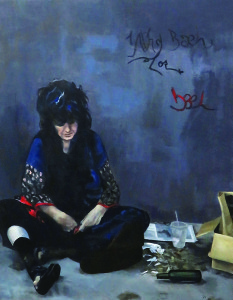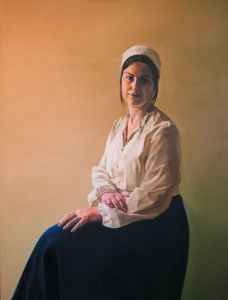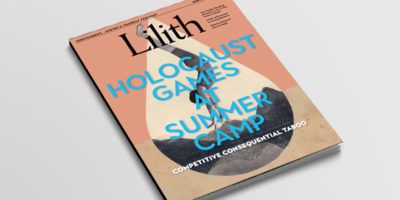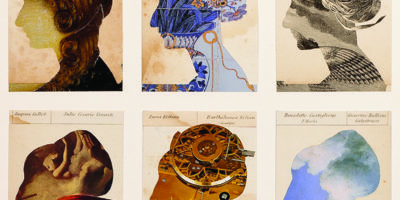Read Today What You Should Do Tomorrow
Beyond Suffrage
Marking a 100th anniversary, this exhibition opens with the long battle for women’s voting rights that culminated in suffrage in 1917 in New York, and 1920 nationally. In the 1920s to the 1940s, New York women worked behind the scenes for health, labor, and good government. New York was central to the women’s liberation movement of the 1960s that continues to this day. Beyond Suffrage: A Century of New York Women through July 22, 2018 at the Museum of the City of New York. mcny.org/exhibition/beyond-suffrage
Promoting a Culture of Peace
The rise of populism in Europe and a culture of hatred and fear brought Veronica Sabbag to found United Voices 4 Peace (UV4P). Sabbag, born into a Moroccan Jewish family in Spain, has a background in music, law, international relations, security and defense, and is creating a global citizens’ platform. Its next project will bring musicians and dancers from Turkish, Israeli, Palestinian and Syrian communities for a residency in March 2018 in Brussels, so they can address refugee integration using music. Uv4peace.org
My So-Called Selfish Life
What does it means to be a woman without children in a culture where motherhood feels mandatory? Filmmaker Therese Shechter is creating a documentary about choosing not to have children. She speaks with a diverse group of women, connecting historical, political and cultural forces that push a message of maternal inevitability so ingrained we sometimes no longer notice. myselfishlife.com
Sing!
From Debbie Friedman to Hanna Tiferet Siegel, Kohenet Taya Shere, Linda Hirschorn, the group MIRAJ, and many more, a proposed Jewish Feminist Songbook aims to restore Jewish women’s voices and stimulate feminist cultural transformation in Jewish communities. For more: Rabbi Geela Rayzel Raphael, rrayzel@shechinah.com.
Torah Stories
For each parsha (weekly reading) of the Torah, Jewish educator Kelly Cohen finds corresponding picture books for young children, Her goal: to promote Torah literacy and engagement. parshastorybookproject.com
Ani Maamin: I Believe
Cantor Shira Lissek writes songs to remember the non-Jews who saved Jews during the Holocaust. She says she feels the imperative to honor the “other,” especially in these times. Her father, also a cantor, was a kindertransport child in Paris during World War II, and she honors him also in her third CD, “Ani Maamin, I Believe: A Voice for Humanity.” shiralissek.bandcamp.com
Maternal Mental Health
Living in a community that has high expectations and a strong commitment to privacy, Orthodox mothers have been largely immune to campaigns to de-stigmatize postpartum depression and other conditions helped by counseling. Now, every newly delivered mother receive a call/visit from a volunteer “ambassador” who offers support, discusses “taboo postpartum topics” and empowers mothers to speak up if they need support. A successful event for fathers, moderated by a male therapist, was titled “Husbands, Hormones and Heroes: What Your Wife Wants You to Understand about the Postpartum Experience.” This project, “Bloom,” is directed by Dvora Entin at Jewish Family & Children’s Service Ma’oz in Merion County, PA. jfcsphilly.org
Girls Only!
Unique for its commitment to social inclusion, Yachad has for 20 years brought high school students together with young adults and teens with special needs on summer tours of Israel. For 2018 they’re offering their first girls-only trip. Yad B’Yad Girls, open to applicants from the U.S. and Canada, July 8 – August 12. yachad.org/yby
“We Are Completely Free”
Surrealism, novel and provocative, imagined women as spontaneous and intuitive beings in control of their private lives. Because it enabled eroticism and poetic emotion to combine as a means of expression, the Surrealist art movement at first attracted women to its ranks. But before long women removed themselves from a movement that saw them primarily as muses, little girls, or clairvoyants. The women were often misunderstood fighters and rebels and, in some cases, were perversely eclipsed or used by their male partners. “We are Completely Free: Women Artists and Surrealism,” includes works by Claude Cahun, Frida Kahlo, Dora Maar and Meret Oppenheim. Through January 28, 2018 at the Museo Picasso in Málaga, Spain. museopicassomalaga.org/en
A.S.L. for Everyone
High-school senior Lauren Ofman believes Jewish people have a responsibility to improve access for and representation of deaf people in our communities because the Third Reich deemed people with disabilities “unworthy of life.” She developed a free course to make it easy for you to teach American Sign Language at your Jewish school or summer camp. aslintrocourse.weebly.com/-the-worthy-project-lauren-ofman.html

“Mildred’s World,” by Pat Berger.
HOME(less) an Exhibition
“We are made homeless by arbitrary acts of nature — fire, flood, the heaving of the earth — and by war, illness, and poverty,” says curator Laura Kruger in describing a new exhibition at Hebrew Union College in Manhattan. The show includes haunting portraits of homeless women: Pat Berger’s acrylic on canvas “Mildred’s World” (left), and Joan Roth’s photo “Katherine Vera, 42nd Street and 9th Avenue” (below). Through June 29, 2018, at Hebrew Union College Museum in Manhattan. huc.edu/research/museums/huc-jir-museum-in-new-york/current-exhibitions

Raanana Shalmon, “Self-Portrait.”
Women Artists at Ein Harod
The quest for meaning in prayer and ritual and for spirituality in everyday life informs the exhibition “Tseno Oreno,” The name means “go out and see” (in the grammatical feminine form); borrowed from the title of a popular 16th-century Yiddish book known as the “Women’s Bible.” This exhibition is a kind of curatorial affirmative action at the Mishkan Museum of Art at Ein Harod, where the backdrop is the Mishkan Museum’s permanent collection of traditional Jewish ritual objects and 19th-century Jewish paintings. Visual images combine with verbal exegesis, as women artists versed in Jewish texts address core issues of religion and feminism: sexuality, body image, gender roles, hair covering, agunot, pregnancy and fertility, barrenness and prolonged singlehood. Until April 2018 at museumeinharod.org.il/en/tzeno-ureno.
Emma Goldman (1869–1940)
The life and social justice work of this Russian immigrant to the U.S.A., the anarchist called by J. Edgar Hoover “the most dangerous woman in America,” is the focus of Abigail Child’s documentary “Acts & Intermissions: Emma Goldman in America.” This cinematic collage, featuring rare archival footage of New York City from the 1910s, is interlaced with a history of social protest. abigailchild.com
— compiled by Naomi Danis
Send your suggestions for this section to info@Lilith.org.



